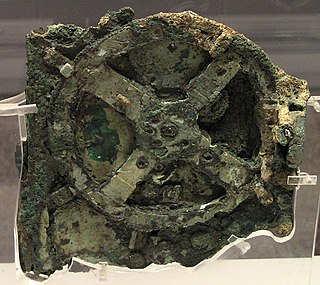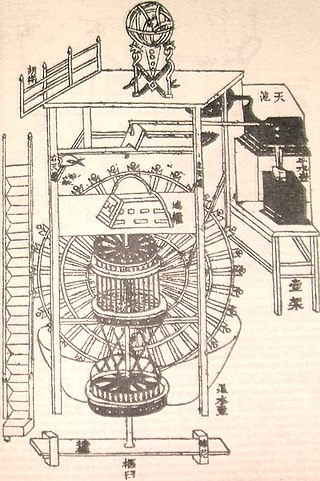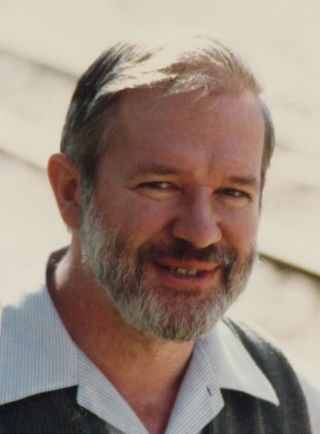
Engineering is the practice of using natural science, mathematics, and the engineering design process to solve technical problems, increase efficiency and productivity, and improve systems. Modern engineering comprises many subfields which include designing and improving infrastructure, machinery, vehicles, electronics, materials, and energy systems.

The Antikythera mechanism is an Ancient Greek hand-powered orrery, described as the oldest known example of an analogue computer used to predict astronomical positions and eclipses decades in advance. It could also be used to track the four-year cycle of athletic games similar to an Olympiad, the cycle of the ancient Olympic Games.

Clockwork refers to the inner workings of either mechanical devices called clocks and watches or other mechanisms that work similarly, using a series of gears driven by a spring or weight.

An automaton is a relatively self-operating machine, or control mechanism designed to automatically follow a sequence of operations, or respond to predetermined instructions. Some automata, such as bellstrikers in mechanical clocks, are designed to give the illusion to the casual observer that they are operating under their own power or will, like a mechanical robot. The term has long been commonly associated with automated puppets that resemble moving humans or animals, built to impress and/or to entertain people.

A mechanical calculator, or calculating machine, is a mechanical device used to perform the basic operations of arithmetic automatically, or (historically) a simulation such as an analog computer or a slide rule. Most mechanical calculators were comparable in size to small desktop computers and have been rendered obsolete by the advent of the electronic calculator and the digital computer.

Derek John de Solla Price was a British physicist, historian of science, and information scientist. He was known for his investigation of the Antikythera mechanism, an ancient Greek planetary computer, and for quantitative studies on scientific publications, which led to his being described as the "Herald of scientometrics".

A user guide, also commonly known as a user manual, is intended to assist users in using a particular product, service or application. It's usually written by a technician, product developer, or a company's customer service staff.

Su Song, courtesy name Zirong, was a Chinese polymathic scientist and statesman. Excelling in a variety of fields, he was accomplished in mathematics, astronomy, cartography, geography, horology, pharmacology, mineralogy, metallurgy, zoology, botany, mechanical engineering, hydraulic engineering, civil engineering, invention, art, poetry, philosophy, antiquities, and statesmanship during the Song dynasty (960–1279).

Antikythera or Anticythera, known in antiquity as Aigilia (Αἰγιλία), is a Greek island lying on the edge of the Aegean Sea, between Crete and Peloponnese. Since the 2011 local government reform, it is part of the municipality of Kythira island.

The history of computer science began long before the modern discipline of computer science, usually appearing in forms like mathematics or physics. Developments in previous centuries alluded to the discipline that we now know as computer science. This progression, from mechanical inventions and mathematical theories towards modern computer concepts and machines, led to the development of a major academic field, massive technological advancement across the Western world, and the basis of a massive worldwide trade and culture.

Allan George Bromley was an Australian historian of computing who became a world authority on many aspects of early computing and was one of the most avid collectors of mechanical calculators.
The Antikythera wreck is a Roman-era shipwreck dating from the second quarter of the first century BC.

An astrarium, also called a planetarium, is a medieval astronomical clock made in the 14th century by Italian engineer and astronomer Giovanni Dondi dell'Orologio. The Astrarium was modeled after the solar system and, in addition to counting time and representing calendar dates and holidays, showed how the planets moved around the celestial sphere in one timepiece. This was its main task, in comparison with the astronomical clock, the main task of which is the actual reading of time. A complex mechanism, it combined the functions of a modern planetarium, clock, and calendar into a singular constructive device. Devices that perform this function were known to have been created prior to the design of Dondi, though relatively little is known about them. It is occasionally erroneously claimed by the details of some sources that the Astrarium was the first mechanical device showing the movements of the planets.

A computer is a machine that can be programmed to automatically carry out sequences of arithmetic or logical operations (computation). Modern digital electronic computers can perform generic sets of operations known as programs. These programs enable computers to perform a wide range of tasks. The term computer system may refer to a nominally complete computer that includes the hardware, operating system, software, and peripheral equipment needed and used for full operation; or to a group of computers that are linked and function together, such as a computer network or computer cluster.

A mechanical computer is a computer built from mechanical components such as levers and gears rather than electronic components. The most common examples are adding machines and mechanical counters, which use the turning of gears to increment output displays. More complex examples could carry out multiplication and division—Friden used a moving head which paused at each column—and even differential analysis. One model, the Ascota 170 accounting machine sold in the 1960s, calculated square roots.

Michael T. Wright, FSA is a former curator of mechanical engineering at the Science Museum and later at Imperial College in London, England. He is known for his analysis of the original fragments of the Antikythera mechanism and for the reconstruction of this Ancient Greek brass mechanism.
Jo Marchant is a freelance journalist specializing in science and history. After gaining a BSc in genetics from Leicester University and a PhD in microbiology she became a science writer, and is the author of Decoding the Heavens, an exploration of the history and significance of the Antikythera mechanism, The Shadow King: The Bizarre Afterlife of King Tut's Mummy and Cure: A Journey Into the Science of Mind Over Body(shortlisted for the Royal Society Insight Investment Science Book Prize 2016). A former editor of the science journal Nature and opinion editor at New Scientist magazine in London, she has written for The Guardian and The Economist.
Information technology (IT) is a set of related fields that encompass computer systems, software, programming languages, and data and information processing, and storage. IT forms part of information and communications technology (ICT). An information technology system is generally an information system, a communications system, or, more specifically speaking, a computer system — including all hardware, software, and peripheral equipment — operated by a limited group of IT users, and an IT project usually refers to the commissioning and implementation of an IT system. IT systems play a vital role in facilitating efficient data management, enhancing communication networks, and supporting organizational processes across various industries. Successful IT projects require meticulous planning, seamless integration, and ongoing maintenance to ensure optimal functionality and alignment with organizational objectives.
Ioannis Theofanidis was a Greek Navy officer and scholar.

John Seiradakis was a Greek astronomer and professor emeritus at the Department of Physics of the Aristotle University of Thessaloniki. He is best known for his contributions in the understanding of radio pulsars, the Galactic Center and archaeoastronomy. Since the early 2000s he was heavily involved in the decoding of the Antikythera mechanism. He was a founding member of the Hellenic Astronomical Society, the European Astronomical Society and the International Olympiad on Astronomy and Astrophysics (IOAA).
















